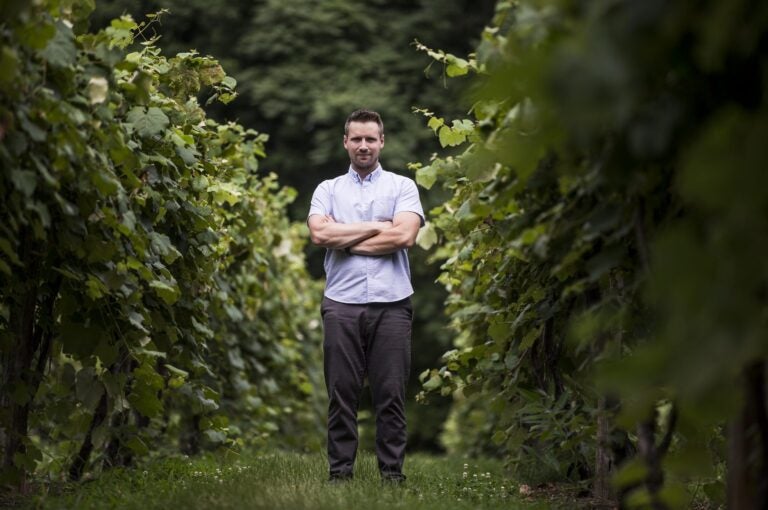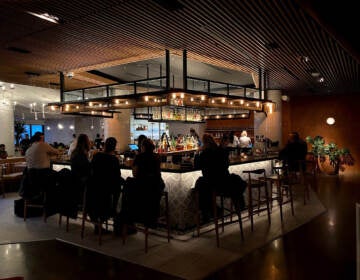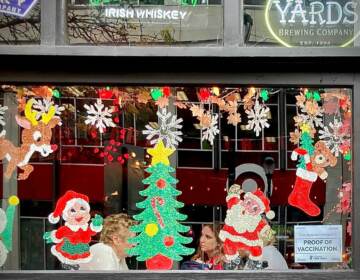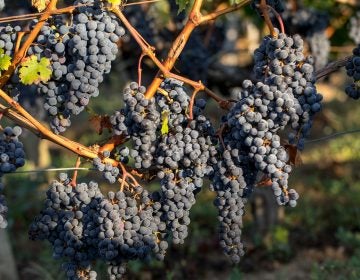Pa. winemakers call for clarity in new COVID-19 mitigation restrictions even as they look to comply
“Our number one priority really is the safety of guests and staff. That’s been our number one priority."

Jonas Nissley of Nissley Vineyards. July 16, 2020 (Sean Simmers / PennLive)
This story originally appeared on PA Post.
Jonas Nissley doesn’t have to immediately scramble to comply with newly issued statewide coronavirus mitigation measures.
Nissley’s outdoor space at Nissley Vineyards is not part of the licensed property, so it’s considered off premise. That means when patrons purchase a bottle of wine to go, they can enjoy it out in the lawn or the covered archway area.
It may seem a technical point but one that allows Nissley to follow newly issued COVID-19 restrictions on food and drink establishments. When patrons purchase a bottle of wine, even if they end up enjoying it on the lawn, they technically do not have to purchase food along with it, as is the requirement under new state guidelines.
“Thankfully the new order does not really affect us in that way,” Nissley said. “We are still able to do wine tastings whether on the lawn or by the covered arch without having to have customers purchase food.”
The Lancaster County based winemaker may just be in the minority among Pennsylvania winemakers.
In the wake of newly rolled out coronavirus mitigation measures, winemakers have been scrambling to comply with the new restrictions, even as proprietors are trying to decipher what the new state mandate means for them.
“Our number one priority really is the safety of guests and staff. That’s been our number one priority,” said Dan Baumgardner, general manager at Adams County Winery, just outside Gettysburg. “But we feel that what came out was vague and not directed at wineries although we are included in the mandate.”
The new mandate forces wineries, like restaurants and bars, to serve sit-down, dine-in meals along with alcohol orders in order to be in compliance with newly released COVID-19 mitigation restrictions issued Wednesday by Gov. Tom Wolf.
Winemakers say the mandate is unclear.
“It’s the language. I think we are looking for further clarification,” said Mario Mazza, proprietor at Mazza Vineyard and South Shore Wine Company of North East in Erie.
“What constitutes a meal? Is it a seated meal? There are some things that are not clear in terms of how that guidance specifically applies to wineries.”
Under Wolf’s orders, the first rollback since the state began reopening counties in May, restaurants and bars across Pennsylvania must dial back capacity limits to 25 percent from 50 percent to help mitigate the spread of COVID-19. The new rules also force bars to close unless they are serving sit-down, dine-in meals, and mandates that alcohol can only be served if it is within the same transaction as a meal or if it is for offsite consumption.
Outdoor seating, takeout and delivery and cocktails to-go are still permitted.
While restaurant and bar owners generally say the new restrictions target their industries and make it nearly impossible to be profitable and maintain full staffing, winemakers are still trying to drill into the nuances of the mandate.
“We are trying to interpret it,” Baumgardner said. “There are some things that make things confusing. We are working through that. Basically do we sell to go or do we incorporate food with each sale for onsite consumption? And what is a meal? What I think is a meal might be a different thing for someone else. The language is very vague. You can tell it was designed for sit down restaurants. Most wineries don’t fall into that category.”
Wineries typically rely on wine tasting to promote business.
Baumgardner has opted out of offering wine tastings and relied on wholesale trade instead.
“We don’t want guests to take their masks off in the tasting room,” he said.
Adams County Winery, however, has an outdoor area with clearly marked borders to allow for social distancing. Still, he is concerned that the new restrictions place added burdens on doing business in the time of the pandemic.
“The issue is if we can’t provide an onsite consumption area, guests are going to go somewhere else,” Baumgardener said. “If we can only sell to go obviously we have to limit staff and that means the potential that staff has to go on unemployment or not work for a while. We hate to see that. We want to keep things working but we have to do what is necessary for the business to survive.”
All Pennsylvania counties currently are in the green phase; masks are now required in retail and other commercial spaces. Wolf issued the order as a precautionary measure ahead of a potential surge in coronavirus cases across Pennsylvania.
At a press conference on Thursday, Wolf elaborated on the restrictions:
“I mean, the rule is you have to serve a meal with the alcohol,” he said. “So if you can do that, then you can go ahead and do what you were doing. If it’s just to have a drink, you can’t. And we’re trying to do that for a fairly short time so that we can..get back to normal as quickly as possible. If we do nothing, we’re going to be overwhelmed by this disease. And that’s going to be a bad thing for all corners of the of the economy. We’re trying to shut this down in a short focused way so that all of us can get back to work as quickly as possible. If we don’t do something, we’re going to be overwhelmed.”
Jennifer Eckinger, of the Pennsylvania Winery Association, said the organization is seeking clarification for winery operations from the state liquor control board.
Mazza says he is a little frustrated: He has been in compliance all along and fully supports measures to stave off the pandemic.
“I would advocate enforcement for those not complying,” he said. “That’s where the challenge is stemming from.”
Nissley said the last thing he is trying to do is dodge the new regulations. The welfare of staff and guests remains paramount, but he is concerned about the long-term impact restrictions might have on his events venue business. Music events at the winery often draw upwards of 2,500 attendees. The thought of delaying a return to that is alone reason to stay in compliance and cap occupancy at the 250 cutoff.
“The thought of going back to yellow, that would not be the best,” Nissley said. “Events are more limited under yellow. We are hoping we can remain in the green phase and any further restrictions will be tweaks.”
Mazza, who also has ample outdoor space that allows for socially distanced seating, questions just how far new restrictions go.
“The question is we have people seated out there. They are having wine tasting and light table service,” Mazza said. “I don’t know how that mitigates anything. The way we are operating we are already being conscientious.”
Mazza contracts with local restaurants to provide food for patrons, but he feels that the food requirement adds another potential challenge for an industry that is already trying to stay in compliance to be open.
“It is going to be difficult as a society to constantly be stuck in a pendulum of open and shut,” Mazza said. “The responsibility is on all of us. If we could all move incrementally we would be better in the long run. Remember slow and steady wins the race. To a degree if all got on board and moved incrementally together, we would be further along, but its human nature. We are struggling with that.”\
WHYY is your source for fact-based, in-depth journalism and information. As a nonprofit organization, we rely on financial support from readers like you. Please give today.


![CoronavirusPandemic_1024x512[1]](https://whyy.org/wp-content/uploads/2020/03/CoronavirusPandemic_1024x5121-300x150.jpg)


